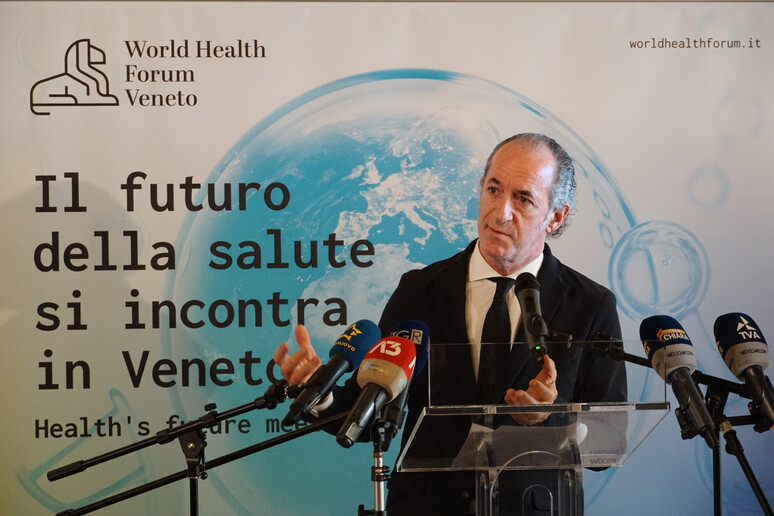A bid by the right-wing League of
Deputy Premier and Transport Minister Matteo Salvini to scrap
the existing two-term limit for regional governors suffered a
major setback on Thursday after the party's majority coalition
partners voted against the move in a Senate committee.
The upper house's Constitutional Affairs Committee rejected the
proposed amendment to a bill on election rules allowing
governors to serve three terms in office with 16 votes to four.
While the League's representatives voted in favour, those of
Premier Giorgia Meloni's right-wing Brothers of Italy (FDI)
party - the main party in the right-centre majority - and the
other alliance partner, the centre-right Forza Italia of Deputy
Premier and Foreign Minister Antonio Tajani, voted against,
together with the main opposition groups, the Democratic Party
(Pd) and the Five Star Movement (M5S).
Salvini, however, played down the rejection, insisting that the
assembly, not the committee, is sovereign.
"The proposal has been rejected at the committee stage and now
it will be discussed in the assembly, which is sovereign, and
the citizens will know what to decide," said Salvini during an
election campaign tour in Sardinia ahead of regional elections
on Sunday.
"In my opinion, it is a shame to retire mayors and governors
after two terms in office, even if they are very good, highly
appreciated and voted for," he continued.
"It is a mistake, because these days it is not easy to find good
mayors and good governors, and if citizens consider them to be
good and want to re-elect them, they have the right to do so.
The League's position in this sense is clear," Salvini added.
The League had also tabled a separate amendment proposing to
lift the current ban on the mayors of municipalities with more
than 15,000 inhabitants from serving more than two terms, before
pulling it early on Thursday.
Salvini also denied reports that the issue of governorship terms
has caused tension within the ruling coalition.
"There will be no problem in the majority if the law on the
third term in office does not pass in parliament," said Salvini.
"The League's position is clear, but we are in a democracy:
sometimes our proposals pass and at other times, as in this
case, they are rejected because all the others, Forza Italia,
FdI, Pd, M5S are against," continued Salvini.
Meloni bore him out.
In a recorded interview for the current affairs programme '5
minutes' on Rai1 she said the third term "was not included in
the (government) programme, it is not an initiative of
government but rather a parliamentary initiative and (during
discussions) there have been differences of opinion in the
utmost serenity".
"It is not a matter that in any way creates problems for the
government or the majority," she added.
Under the existing rules, several regional governors including
the League's highly popular Veneto Governor Luca Zaia face
having to step down at the next regional elections - in Zaia's
case, in 2025.
The 55-year-old from Conegliano and agriculture minister under
the late former premier Silvio Berlusconi from 2008 to 2010
first took charge of Veneto in 2010, before the northern region
incorporated the national law setting the two-term limit into
its regional election law in 2012.
Since the measure could not be applied retroactively, he was
consequently able to stand for another two terms, in 2015 and
again in 2020.
However, on Thursday Zaia seemed unperturbed.
"I take note of the vote," Zaia told ANSA.
"The road is still long. Natura non facit saltus (nature does
not make jumps)," he added.
Meloni is reported to be against dropping the two-term limit
because she wants more regions to be in the hands of
representatives of her FdI in order to reflect the fact that it
is now the driving force of the majority alliance.
Separately on Thursday the Conference of Regions, the forum for
interregional institutional dialogue, sent a letter to Regional
Affairs Minister Roberto Calderoli requesting a meeting on the
issue.
The Conference, composed of Italy's 21 regions and autonomous
provinces, has repeatedly spoken out in favor of scrapping the
limit on terms in office, most recently in December.
Meanwhile Liguria Governor Giovanni Toti, whose second term in
office ends in 2025, said there is a "gigantic political
short-circuit" on the issue.
"Lawmakers who are opposed to additional terms of office for
governors and mayors have sometimes been sitting in parliament
since the 1980s and 1990s, so a sort of geological era ago,"
said Toti.
"This happens in a Republic where there is no limit for the
premier and for ministers and where the government is discussing
the direct election of the prime minister," he added.
ALL RIGHTS RESERVED © Copyright ANSA











